Our research focuses on 1) understanding the molecular mechanisms underlying T cell dysfunction in immune-related diseases and 2) engineering novel immunotherapies that reverse these pathological defects.
Project 1: T Cell Engineering
Our lab has identified genetic and epigenetic mechanisms that control T cell fate and biology. We study the natural experiments of T cell clones that acquire somatic mutations to increase their fitness and alter their effector function. We have recently been harnessing this knowledge to engineer better adoptive T cell therapies, particularly for cancers. As an example, we recently discovered that CARD11-PIK3R3 enhances the potency of T cell therapies over 100-fold, enabling durable cures in preclinical models of multiple solid tumors. This potency enhancement is being advanced to the Clinic.

Project 2: Curing Autoimmune Disease
In collaboration with Deepak Rao, M.D., Ph.D., at Brigham, we are investigating the molecular mechanisms underlying pathogenic T cells in autoimmune diseases like systemic lupus erythematosus. Using CRISPR screening and epigenetic approaches, we have identified key transcriptional drivers of T peripheral helper cells and explored strategies for reprogramming these cells. Our findings, to be published in Nature, is the inspiration for novel therapeutic approaches for autoimmune diseases.
Project 3: T Cell Lymphoma
Through extensive genomic analysis of a growing cohort of patients, we have identified key genetic drivers of T cell lymphomas. Our findings have revealed novel mutations in genes involved in T cell receptor signaling, including the first reported gain-of-function mutations in CD28, RLTPR, and CSNK1A1. These mutations enhance T cell receptor signaling without completely replacing its function.
Unexpectedly, we discovered that many T cell lymphomas exhibit features of T cell exhaustion, despite our initial prediction of hyper-responsiveness to antigens. However, a subset of lymphomas with inactivating mutations in PD1 showed enhanced proliferation in vitro and poorer clinical outcomes in vivo. These PD1-mutant lymphomas are characterized by increased PI3K-dependent anabolism and altered epigenetic modifications. These findings are summarized in manuscripts at Nature Genetics, Nature Communications, Cell Reports, Blood and Nature Cancer.
Our goal is to better understand molecular mechanisms, validate the biomarker across a larger, multi-institutional cohort, and to develop novel therapies.
Project 4: Precision Medicine
To develop personalized treatment approaches, we are analyzing the immune cell composition of tumor and autoimmune microenvironments using single-cell RNA-sequencing and spatial transcriptomics. Our goal is to identify specific molecular pathways involved in disease progression and drug resistance, which may lead to the discovery of targeted therapies. We have recently deployed this approach to identify the cellular and molecular causes of resistance to immunotherapy in an otherwise dea